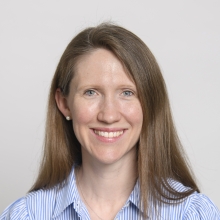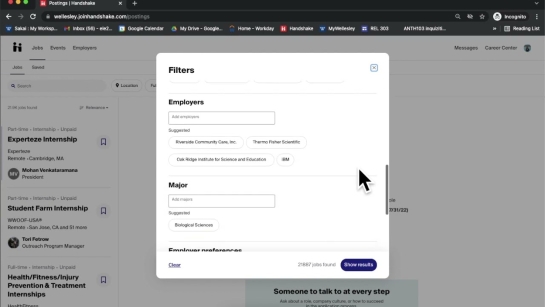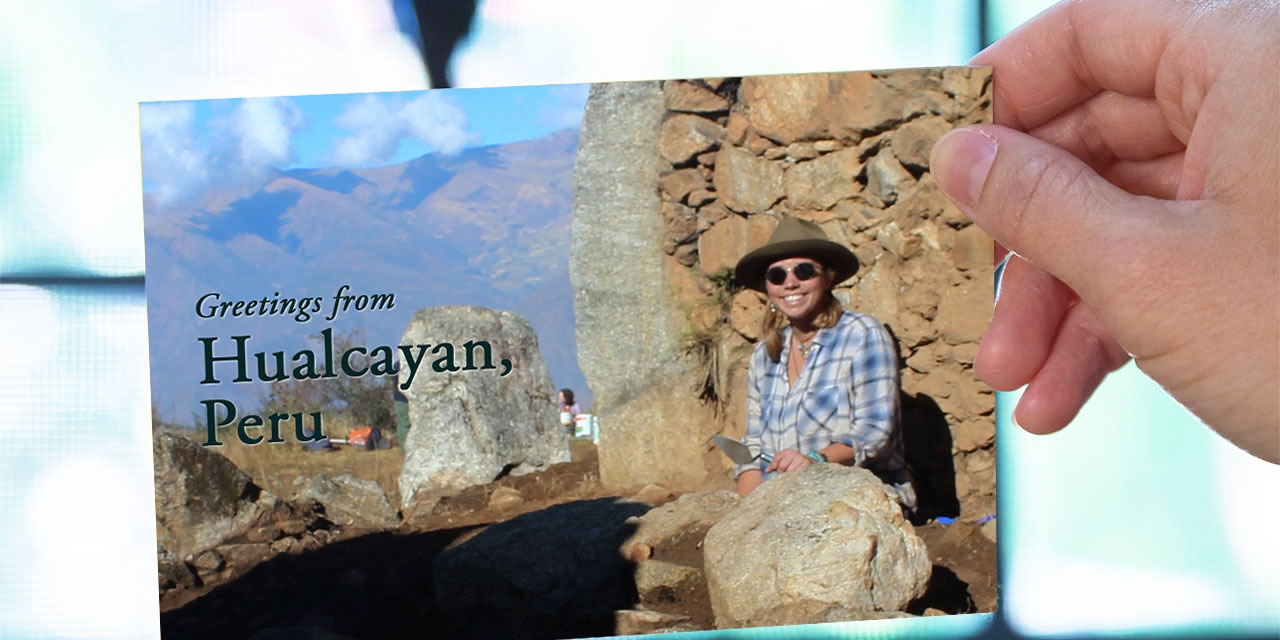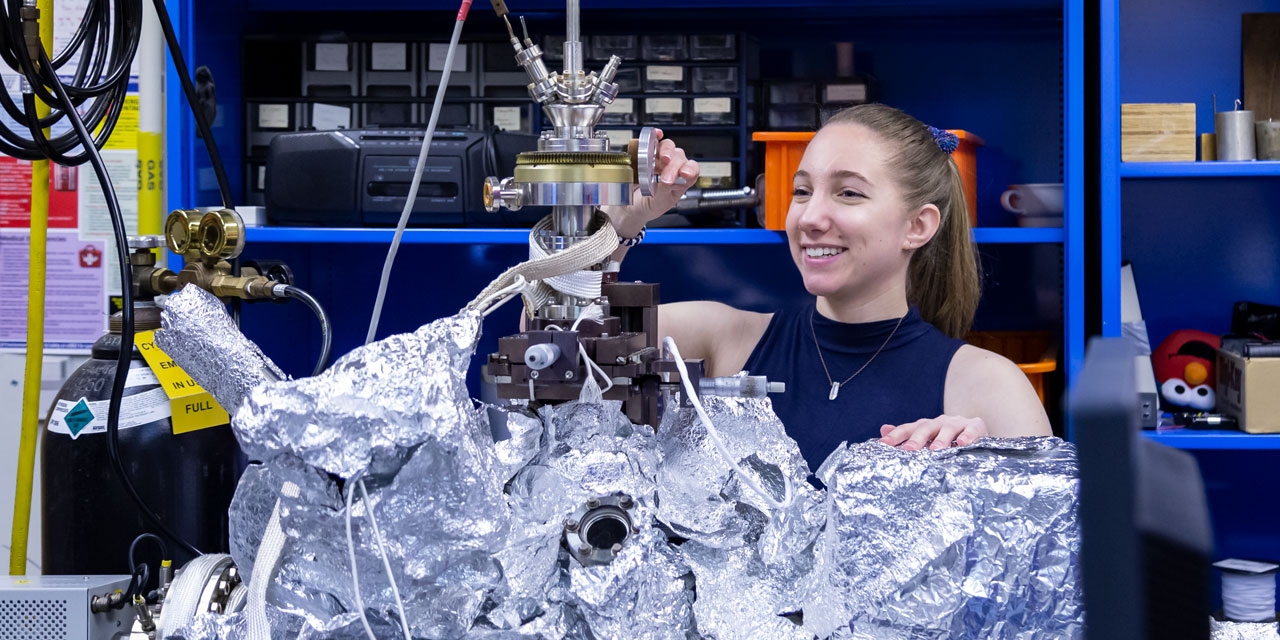Handshake Disclaimer & Employer Policies

Career Education explicitly makes no representations or guarantees about job postings and external events, or the accuracy of the information provided by an employer/organization/graduate school.
Employer Engagement Opportunities Menu (Spring 2024)

This menu is available to employer partners who are offering summer internship and/or full-time roles.
Employer Engagement Diversity, Equity, and Inclusion Statement

Read our DE&I statement and learn about how employers can engage with Wellesley at a DE&I Partner Tier of Engagement by meeting our criteria for DE&I standards.
Off-Campus Employment, Caregiving, and Home-Based Services Policy

Please see here for an outline of our policies around part-time and local employment hiring.
“Under the Andean sun, we excavate the site that shows evidence of occupation for nearly 3,000 years.”
“I previously had dreams to be an author, but found myself called by the combination of logic, mystery, and truth in science.”
Physical Sciences

The physical sciences, as a branch of natural science, focuses primarily on the study of non-living systems. However, just as these areas of study are broad, the physical sciences intersect with a wide range of career opportunities, which can be found in the private sector, in education and academia, and in all levels of government.
Employer Handshake Resources

Handshake has helpful tutorials for employers, which we have compiled in this resource. Use the links below to learn about:
- How to Create a User Account, Join a Company, and Connect with Schools
- Posting Jobs on Handshake
- Requesting an Event (Tabling, Coffee Chats and Employer Connection Sessions)
- Registering for a Career Fair
- Requesting an on campus Interview schedule
- Accessing and Managing Event RSVP
- Messaging Students
- Searching for Students and Downloading Public Resumes
Recruiting Best Practices (Students)

Career fairs, meetups, and industry insight events are a great opportunity to gain exposure to a specific industry, job function or sector.
Physics

The contemporary study of the physical universe encompasses systems ranging from the microscopic — atoms, nuclei, and elementary particles, to the very large — planets, stars, and galaxies, and the Wellesley Physics department introduces students to the study of all that falls along that spectrum. Since physics covers such a broad band, students of physics develop concrete and transferable skills that can be applied in a number of different settings — academia, industry, research, government, nonprofits, and more.
Mathematics

Mathematics is essentially the study of patterns, and the understanding and application of these patterns is essential for the foundation of all other sciences. While mathematics is often studied in its own right, it is also applied to all manner of real world problems found in business, government, laboratories, medicine, engineering, and more.
Geosciences

Geoscience is the study of earth and all of its systems, and geoscientists investigate these interactions using transdisciplinary approaches to address questions related to how the Earth formed, how it evolved over geologic time, and how its continued evolution affects the environment in which we live. With geoscience being such a broad major of the study of the earth, there are many areas in which one could specialize and use to pursue career opportunities.
Chemistry

Chemistry is the knowledge of the properties and behavior of atoms and molecules, and it is crucial to our understanding of medicine, biological systems, neuroscience, nanotechnology, environmental science and a myriad of other areas. Therefore, there are a wide range of career options for chemistry majors and minors!
Astronomy

What is astronomy? In the most basic definition, astronomy is the study of the sun, moon, stars, planets, comets, gas, galaxies, gas, dust and other non-Earthly bodies and phenomena. As you think about careers in astronomy or astrophysics, the profession is a relatively small community compared to other science career fields.
“Medicine is about studying how life works, but the practice of medicine is also learning about life through other people. I have appreciated the opportunity to experience both this summer.”
On-Campus Recruiting Program Policies (Students)

Career Education expects all students to abide by the following rules in order to maintain the success and integrity of Wellesley’s recruiting program.
Campus Recruiting Program Policies (Employers)

Wellesley College has developed the following guidelines to promote an equitable and fair recruiting experience on behalf of our employers as well as our students. It is our expectation that employers who participate in campus recruiting become familiar with the following policies as well as reference these policies throughout the year.
Navigating the Job Search: The 4 Step Model

The four steps in this resource will help keep you focused and productive in your search. You should plan on revisiting each step as your knowledge and understanding of positions and industries grow. Each step below is outlined without a specific industry or position in mind. It is best to schedule an appointment with your Advisor for Career Exploration (ACE) or an Industry-specific Career Advisor to customize your process. The questions we have provided at each step are designed to help you reflect on your preparedness and identify what you may need to move forward in the process.
National Institutes of Standards & Technology Summer Undergraduate Research Fellowship (NIST SURF) (students)

The National Institute of Standards and Technology (NIST) offers Summer Undergraduate Research Fellowships (SURF) at NIST laboratories in Gaithersburg, MD; Boulder, CO; and Waimanalo, Hawaii. The Summer Undergraduate Research Fellowship is designed to inspire undergraduate students to pursue careers in STEM (science, technology, engineering, and mathematics) through a unique research experience that supports the NIST mission. Eligible are currently enrolled undergraduates who are US citizens or permanent residents, majoring in chemistry, computer science, physics, engineering, materials science, fire research, nanotechnology, information technology, mathematics, biology, manufacturing, statistics, or another STEM discipline.






